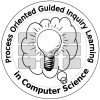Context: You want to help students improve their work and their process, so that future work also improves.
φφφ
Forces & Problem: Many students (and teachers) are accustomed to teacher-centered environments where the teacher is the primary source of direction, guidance, and feedback. Thus, students often treat Feedback as a list of changes for the current work, and might not see its relevance to other, future work. Student have different backgrounds, motivations, and needs, which might not be apparent to teachers. Students need Feedback to improve their work and their work process, but external feedback (from a teacher) is not always available, might miss the mark, or might not have the desired effect. A teacher has limited time and might not be able to provide detailed Feedback for every student, particularly in large classes. Furthermore, teachers should help students prepare for situations where external feedback is not available.
φφφ
Solution & Consequences: Therefore, ask questions and use activities that prompt students and teams to think about how they work, and how to work more effectively. In the short term, this takes added time during or outside of class, but over time students learn to work more effectively and improve continually.
Discussion: Think About How You Work is particularly relevant for Groups Work, Self-Managing Teams, and when Students Interact and Construct Understanding. It is related to Feedback and Peer Feedback but helps students to give feedback to themselves and their teammates, rather than expect feedback from a teacher. It is also related to Debrief After Activities and Report Out, but focuses less on what students learn and more on how they learn. Just as assignments should Climb Bloom’s Taxonomy from rote learning and repetitive procedures to higher order thinking, Feedback should also progress toward higher levels.
Think About How You Work also applies in many other settings - a colleague teaching a class or writing a paper, a team that you work with or lead, etc.
Examples: Prompt students to Think About How You Work in a few minutes during class, as a short writing prompt at the end of a class, or as an assignment outside of class. Consider a variety of approaches:
- Ask general questions, such as:
- What worked well and why?
- What could be improved and how?
- Use Describe SII (Strengths, Improvements, Insights) for a student, team, assignment, etc.
- Provide a more specific prompt, such as:
- How did you handle potential distractions? (phone, email, other students, etc.)
- Which example was most helpful? Why?
- Which approach was most successful? Why?
- How did your team utilize team roles?
- How did your team use supporting tools and materials?
- What could you do differently in the future to work more effectively and efficiently?
Author: Clif Kussmaul
Publication: C Kussmaul. 2017. Patterns in classroom facilitation for Process Oriented Guided Inquiry Learning (POGIL). HILLSIDE Proc. of Noridc Conf. on Pattern Lang. of Programs. 17. (Mar-Apr 2017)
